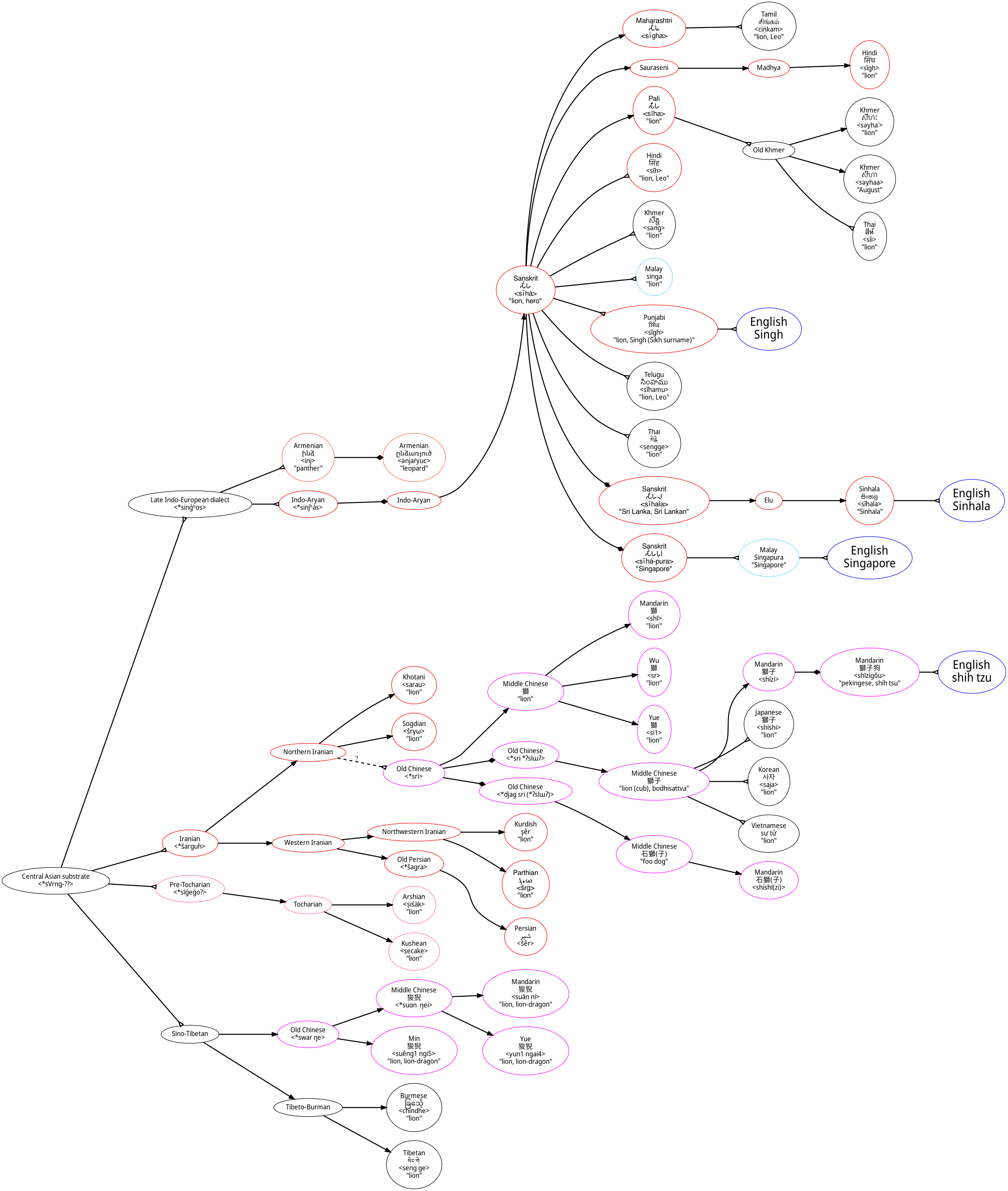January theme: Lions 🦁
Teaser
Singh, Sinhala, Singapore, shih tzu
Full Text
-
Central Asian substrate *sVrng-??
-
Late Indo-European dialect *sinǵʰos
-
Armenian ինձ inj panther
- Armenian ընձառյուծ ənjaṙyuc leopard
-
Indo-Aryan *sinȷ́ʰás [1]
-
Indo-Aryan
-
Sanskrit 𑀲𑀺𑀁𑀳 sĩhá lion, hero [2]
-
Maharashtri 𑀲𑀺𑀁𑀖 sĩgha
- Tamil சிங்கம் ciṅkam lion, Leo
-
Sauraseni
-
Madhya
- Hindi सिंघ sĩgh lion
-
-
Pali 𑀲𑀻𑀳 sīha lion
-
Old Khmer
- Khmer សីហៈ səyhaʾ lion
- Khmer សីហា səyhaa August via Leo?
- Thai สีห์ sǐi lion
-
- Hindi सिंह sĩh lion, Leo
- Khmer សឹង្ហ səng lion
- Malay singa lion
-
Punjabi ਸਿੰਘ sĩgh lion, Singh (Sikh surname)
- English Singh
- Telugu సింహము sĩhamu lion, Leo
- Thai སེངྒེ sengge lion
-
Sanskrit 𑀲𑀺𑀁𑀳𑀮 sĩhala Sri Lanka, Sri Lankan "of/with the lions"
-
Elu
-
Sinhala සිංහල sĩhala Sinhala
- English Sinhala
-
-
-
Sanskrit 𑀲𑀺𑀁𑀳𑀧𑀼𑀭 sĩhá-pura Singapore lit. "Lion-City" [3]
-
Malay Singapura Singapore lit. "Lion-City"
- English Singapore
-
-
-
-
-
-
Iranian *šarguh [1]
-
Northern Iranian
- Khotani sarau lion
- Sogdian šrγω lion
-
Old Chinese *sri
-
Middle Chinese 獅 lion
- Mandarin 獅 shī lion
- Wu 獅 sr lion
- Yue 獅 si1 lion
-
Old Chinese *sri *ʔslɯʔ lit. "lion child"
-
Middle Chinese 獅子 lion (cub), bodhisattva
-
Mandarin 獅子 shízi
-
Mandarin 獅子狗 shīzigǒu pekingese, shih tsu lit. "lion-cub-dog"
- English shih tzu
-
- Japanese 獅子 shishi lion
- Korean 사자 saja lion
- Vietnamese sư tử lion
-
-
-
Old Chinese *djaɡ sri (*ʔslɯʔ) lit. "stone lion (child
-
Middle Chinese 石獅(子) foo dog
- Mandarin 石獅(子) shíshī(zi)
-
-
-
Western Iranian
-
Northwestern Iranian
- Kurdish şêr lion
- Parthian 𐫢𐫡𐫃 šrg lion
-
Old Persian *šagra
- Persian شیر šêr
-
-
-
Pre-Tocharian *sīǵeǵo?
-
Tocharian
- Arshian ṣiśäk lion
- Kushean ṣecake lion
-
-
Sino-Tibetan
-
Old Chinese *swar ŋe
-
Middle Chinese 狻猊 *suɑn ŋei
- Mandarin 狻猊 suān ní lion, lion-dragon
- Yue 狻猊 yun1 ngai4 lion, lion-dragon
- Min 狻猊 suêng1 ngi5 lion, lion-dragon
-
-
Tibeto-Burman
- Burmese ခြင်္သေ့ chindhe lion
- Tibetan སེང་གེ seng ge lion
-
-
Visual
Collected English words
Singh, Sinhala, Singapore, shih tzu
Footnotes
-
^
Iranian *šarguh is formally derivable from Indo-Iranian *(C)šargus, but I haven't found any indication of it in Indo-Aryan. Likewise, Indo-Aryan *sinȷ́ʰás can be formally derived from Indo-Iranian *sinźʰás from PIE *sinǵʰos, but there is no Iranian descendant of that form. So they probably represent separate borrowings of the wanderwort.
Though, interesting note, if Iranian *šarguh was derived from a borrowing into Indo-Iranian, it would appear to have had an extra consonant in the initial cluster, probably *kš-, which would make it look an awful lot like a BMAC borrowing.
-
^
Though Sanskrit 𑀲𑀺𑀁𑀳: "lion" is siṃhá in standard transliteration, the 𑀁 (or anusvara) is really a diacritic marking either an undetermined nasal N takes on the place of the following consonant, or nasalization on the preceding vowel. I feel it is more accurate in general, and especially more useful in this particular context, to transliterate it as a tilde diacritic (◌̃).
Also, the h is really /ɦ/, a sound transliterated as g from some languages, which helps make sense of why it looks like Indo-Aryan j part of -ȷ́ʰ- disappeared in Sanskrit, and then came back as g(h) in some later forms.
So, once we've determined the Sanskrit transliteration of "siṃhá" is misleading, the Swahili simba: "lion" is not as similar as it looks. The Swahili is from Proto-Bantu *ǹcímbá: "wild feline, lion, leopard", and Proto-Bantu is unlikely to be from a Central Asian substrate!
-
^
The Sanskrit pura: "city" in sĩhá-pura (Singapore) is a reflex of the same IE as Greek polis: "city" (whence English "metropolis", "policy", and "police").
